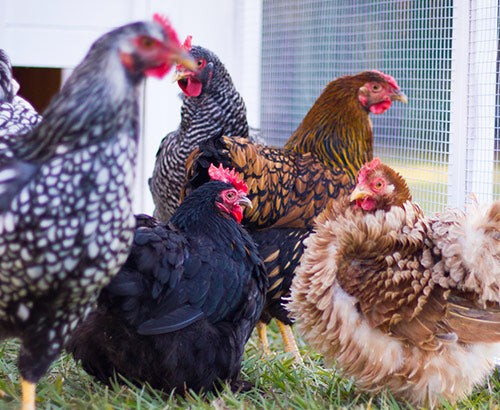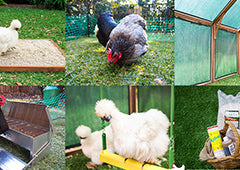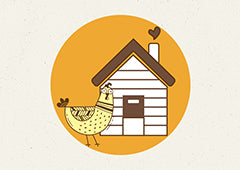Hello chicken keepers!
When I started keeping chooks I knew 3 kinds - brown ones, black ones and white ones. They all clucked, they all laid eggs and they all pooped. A lot.
Boy-o-boy was I green.
Over the years I’ve become a bit of a connoisseur of plumage. An enthusiast for the humble but astounding gallus gallus domesticus, one might say. All domestic chicken breeds can be further classified into hybrid, heritage, purebred, or bantam chickens. It’s enough to scramble a chicken keeper’s brains! So, if you're just starting out on your chook lovin’ adventure, let’s get you up to scratch on who is who in the chicken coop.
Purebred chickens
Purebred chickens are chicken breeds that were developed through careful selection by small farms and breeders, or through natural intermingling between wild breeds. Purebred chickens generally have a distinctive appearance, and are most commonly named after their particular place of origin, eg. Leghorn, Orpington, Dorking (pictured above), Andalusian.
Many purebred chicken breeds were once kept for their egg-ceptional egg production, but because of a tendency to breed ‘for show’ (ie. for physical characteristics), modern bloodlines of these chickens aren’t quite as capable egg layers - a classic case of form over function. For example, the Australorp chicken was once famed for laying as many as 350 eggs per year, while modern Australorps lay a more modest 250 eggs.
So why would you keep purebred chickens? There are a few good reasons:
- Purebreds have more personality than commercial layers
- Purebreds are more adaptable to different conditions, including changes in temperature and diet
- Purebreds are more alert and flighty, which makes them more difficult to handle, but better at evading predators
- Purebreds generally live longer
- Purebreds generally lay for longer, and may continue laying well into old age
- Purebreds have fantastic potential for egg laying, which can be rediscovered through selective breeding
- Purebreds are part of our cultural heritage, and keeping and breeding them contributes to wildlife diversity
Heritage chickens
Heritage breeds are a subset of purebred chickens. The term generally refers to older breeds like White Faced Black Spanish chickens, and Cochin chickens, from which many other ‘purebred’ varieties are descended. However, ‘heritage’ is often used interchangeably with ‘purebred’, and (unless you’re very serious about your chicken breeds) there isn’t a real practical difference between the two.
Hybrid or commercial layers
Hybrid hens are absolute egg laying machines! You will already have heard of the famous Isa Brown (pictured above), but there are countless hybrid chicken breeds, and they are usually identified by a company name - eg. Hy-line Brown, Lohmann Brown. These chicken breeds are developed through careful, scientific selection and genetic engineering in order to maximise traits that are desirable for commercial egg production. This means that they are absolutely outstanding egg layers (and always improving): the average Isa Brown will give you an egg nearly every day. They are also extremely docile, and can get by with comparatively little space and feed. However, their laying life is short - usually 2 years or less, and so any chicken keeper with Isa Browns should think carefully about what their retirement plans will be.
Bantam chickens
In simple terms, bantam chickens are simply miniature chickens! They’re cute, cuddly and smaller in every way, from their bodies to their eggs. Expect the average bantam to be half to one-third of the size of a full-grown hen, with compact eggs to match. For this reason, they are perfect for suburban backyards where space is at a premium. However, though their small size makes them much easier to handle, it also means they are better at flying, so read up on wing clipping unless you want your bantams to meet the Joneses!
All purebred chickens also have a bantam counterpart (commercial layers do not - small eggs are bad for business), and there are also so-called ‘true’ bantams, like the Belgian bantams (the Barbu d'Anvers pictured above), which are bantam-only.
Which variety of chicken you choose ultimately depends on your circumstances. If you want a personable pet with history and character, choose a purebred or heritage breed. If you want an egg-cellent layer, choose a hybrid. If space is limited, choose a bantam. And if you’re chicken crazy like us, choose all of them!
Purebred, Hybrid, Bantam or Heritage? Add this decision with the many stunning breeds to choose from and it can be confusing and difficult to find the perfect match for you and your family. From looks, to personality, to egg-laying talents - where should you begin?
Cluckily, our feathered friends over at Chickenpedia have created an amazing Chicken Breeds Course. This extensive online course shares useful advice on choosing the right chickens for you as well as size & frequency of eggs laid. You’ll even learn about their individual personalities, and be able to use their family-friendly compatibility scale through this well-structured program. It really is a great way to find your perfect backyard buddies which is why I highly recommend them to all of my readers! The courses are beginner-friendly and filled with vital information to help you raise a happy, healthy flock.
As chicken keepers, we want to do an eggcellent job when caring for our feathered friends, but many of us struggle to handle chicken health or behavior issues, especially in the first few years of having a flock. Chickenpedia have a full range of comprehensive online courses that cover everything you didn’t know you need to know and then some more! From healthcare to raising baby chicks to feeding and behavior, that’ll give you the knowledge and confidence to successfully look after your chickens like a proper eggspert.
As a member, you will get access to ALL their fantastic courses. So, no need to wing it, become a confident chicken keeper. Click here to check out Chickenpedia today!
After some more cheeky chook action? Join our communities on Facebook, Instagram, Twitter and Pinterest!
Feathers Forever,
Kassandra x





















